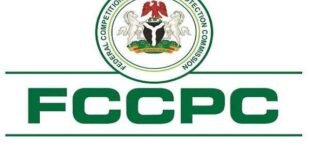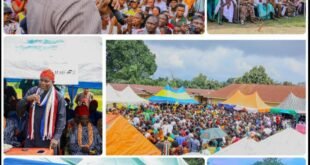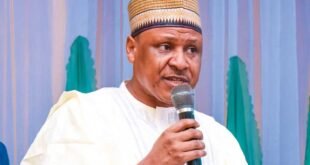Central Bank of Nigeria (CBN) Governor Olayemi Cardoso has blamed excessive printing of the naira and other policies initiated by his predecessor, Godwin Emefiele, for the country’s current economic situation.
He also cited the fall in oil prices in the international market as another cause of the problem.
Cardoso stated this on Tuesday at a press conference at the end of the 297th meeting of the Monetary Policy Committee (MPC) held on September 23-24 in Abuja.
Ripples Nigeria previously reported that Cardoso announced the committee’s decision to further raise the Monetary Policy Rate (MPR) which measures interest rates by 50 basis points from 26.75% to 27.25% to tighten the inflation rate which is standing at 32.15%.
The MPC under Cardoso last year raised interest rates by 8.5%, from 18.75% in September 2023, to 27.25% 12 months later. Under Cardoso, the naira, which exchanged for around ₦700/$1 in September 2020, now sells for more than ₦1,600/$1.
When asked whether the central bank’s monetary policies, including repeated interest rate hikes and the closure of the foreign exchange market, had succeeded in addressing the economic hardships facing Nigerians, the CBN chief blamed the policies of his predecessors for the country’s monetary situation.
He said: “You cannot separate the situation that is happening now from what happened in the last year.
“We entered a very loose money supply situation between 2017 and 2023 and saw liquidity pumped into the system.
“In 2015, the money supply was about N19 trillion, and by 2023, it will be N54 trillion. That is a huge increase, a huge increase. And then that substantial amount is through various ways and means.
“So, essentially, printing money results in a large amount of money chasing the same amount of goods or a relative amount of goods. I think that context is really important to have.”
Known as Ways and Means, the apex bank offers short-term financing to the Federal Government to cover its budget shortfalls.
“Don’t forget that we went through a situation when world oil prices crashed in 2015. With the crash in world oil prices, unfortunately, and this is a fact of life, Nigeria is a country with a very strong economy.
“So you are dependent on oil for everything, and as a result of the fall in oil prices, foreign exchange starts to shrink and it is important to understand that in this period, the response to that is the decline in foreign exchange and the pricing of foreign exchange, and that also hurts the economy to no end,” he added.
Cardoso also said “efforts to harmonise exchange rates have borne fruit” and Nigerians “no longer have multiple windows”.
He said the exchange rate was now more flexible and people could “transact their business through willing buyers, willing sellers, as opposed to a situation where different exchange rates were inhibiting and not allowing that to happen”.
“I accept that there are a lot of people out there who are finding it very difficult, but I want to say that the things that we are doing are taking the economy of this country down a trajectory that we should not be on and looking back at some of the inefficiencies that we have seen in our system for some time now. I believe this is a short-term pain and I believe we will get out of the situation that we are in.
“Even though it is difficult, and I admit it is difficult, we have no choice but to use this instrument to control the excess liquidity in the system, high inflation and encourage portfolio investors who have fled to come back and invest in Nigeria,” the CBN governor concluded.
By: Babajide Okeowo
Cardoso blames money printing, oil price crash for Nigeria’s economic woes first appeared on Latest Nigeria News | Headlines from Ripples Nigeria.
 JamzNG Latest News, Gist, Entertainment in Nigeria
JamzNG Latest News, Gist, Entertainment in Nigeria








